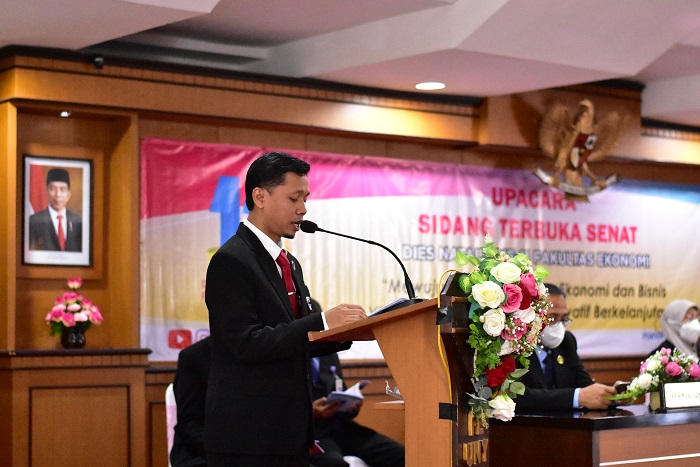You are here
Dies Natalis 11: Economics Education and Business Outlook

Being a Legal-Entity Higher Education Institution (Perguruan Tinggi Negeri-Berbadan Hukum) demands a higher quality of education and teaching. With Merdeka Belajar Kampus Merdeka (Independent Learning Independent Campus) curriculum implementation, lecturers need to provide more assistance and have experience in implementing internships and industrial practices. In addition, universities are now required to fulfill various performance quality standards including Key Performance Indicators (Indikator Kinerja Utama), national rating assessments, and QS rankings. The presence of foreign students is also a significant benchmark in the recognition of world-class universities, said the Dean of the Faculty of Economics (FE) UNY Dr. Siswanto, M.Pd., in his report at the Ceremony of the 11th Anniversary of FE UNY, Wednesday (22/6).
Siswanto continued, FE UNY supports its students to study outside campus through various schemes; internships/industrial practices, village projects, student exchanges, teaching in schools, and so on. "Several students study both online and offline at several overseas campuses, such as Kasetsart University, and the University of Nottingham in the coming semester," he explained.
Dean of FEB Universitas Negeri Malang, Prof. Dr. Cipto Wardoyo, M.Pd., M.Sc., Ak., CA said that today’s students are far different from their predecessors, and education practitioners must pay attention to this. “Generation Z has digital natives character, and the current character of learning is starting to be based on multimedia, but there is a gap between today's industrial world and the students we have prepared. Therefore, there needs to be a new model of how to prepare students so that when they graduate, they will not be left behind,” he said.
Cipto added, we used to know the Expert-Centered Learning model and then shifted to Work-Based Learning. Work-Based Learning was considered capable of meeting the demands of the working world at that time. “But now along with the extraordinary development of technology, the competencies taught on campus may no longer be needed in the world of work when students graduate. With Life-Based Learning, students are not only objects, but also subjects that also determine capabilities, and this seems to be in line with the MBKM program which allows students to study outside their campus for 3 semesters," added Cipto.
With the development of industry and technology, the direction of economic and business education will be more complex, Cipto continued. “There are now face-to-face, remote, and hybrid modes of learning. Then learning strategies can be problem-based, project-based, gamification, to life-based learning. In addition, it is also necessary to teach transversal competencies such as critical thinking, cooperation, collaboration, communication, and creativity," explained Cipto.
The Ceremony of the 11th Anniversary of FE UNY was held in a blended mode. Some of the guests attended directly in the FE UNY Auditorium and also some of them attended online via Zoom. The vice-rectors of UNY, deans of UNY, lecturer representatives at the FE UNY, and the faculty senate attended the event offline. (fdhl-ed:lia)
Faculties, Graduate School, and Directorates
- Faculty of Education and Psychology
- Faculty of Engineering
- Faculty of Mathematics and Natural Sciences
- Faculty of Languages, Arts, and Cultures
- Faculty of Social Sciences, Law, and Political Science
- Faculty of Health and Sports Science
- Faculty of Vocational
- Graduate School
- Directorate of Quality Assurance
- Directorate of Researches and Community Services
Contact Us
Copyright © 2024,
